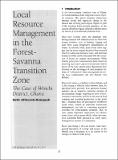| dc.contributor.author | Afikorah-Danquah, Seth | en |
| dc.date.accessioned | 2016-02-24T15:23:35Z | |
| dc.date.available | 2016-02-24T15:23:35Z | |
| dc.date.issued | 01/10/1997 | en |
| dc.identifier.citation | Afikorah-Danquah, S. (1997) Local Resource Management in the Forest?Savanna Transition Zone: The Case of Wenchi District, Ghana. IDS Bulletin 28(4): 36-46 | en |
| dc.identifier.issn | 1759-5436 | en |
| dc.identifier.uri | https://opendocs.ids.ac.uk/opendocs/handle/20.500.12413/9191 | |
| dc.description.abstract | Summary In Ghana's forest?savanna transition zone, recent ecological debates counterpose the dominant view that human activities cause progressive savannisation of forests, with competing views that the forest?savanna boundary is relatively stable, and even that people can assist the formation of forest in savanna. Applying the environmental entitlements approach to people?vegetation interactions in the Wenchi area of Brong Ahafo region, this article shows that ecological outcomes vary for different parts of the landscape, depending on the particular practices of socially?differentiated land users. The cases of farming by local landowners, farming by immigrants from the north, and charcoal production illustrate how such practices are shaped by diverse local and state?level institutions, especially land and tree tenure arrangements, with implications for current attempts to develop collaborative forms of forest management in Ghana. | en |
| dc.format.extent | 11 | en |
| dc.publisher | Institute of Development Studies | en |
| dc.relation.ispartofseries | IDS Bulletin Vol. 28 Nos. 4 | en |
| dc.rights.uri | http://www.ids.ac.uk/files/dmfile/IDSOpenDocsStandardTermsOfUse.pdf | en |
| dc.title | Local Resource Management in the Forest? Savanna Transition Zone: The Case of Wenchi District, Ghana | en |
| dc.type | Article | en |
| dc.rights.holder | © 1997 Institue of Development Studies | en |
| dc.identifier.doi | 10.1111/j.1759-5436.1997.mp28004005.x | en |

